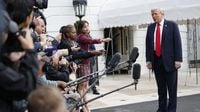On September 16, 2025, President Donald Trump signed an executive order that once again delays the enforcement of a nationwide ban on TikTok, the wildly popular social media app, until mid-December. This marks the fourth time the Trump administration has postponed the ban’s implementation, a move that arrives just as American and Chinese officials claim to have reached a preliminary framework for a deal that could determine TikTok’s fate in the United States.
The saga began in earnest in 2024, when Congress—spurred by bipartisan concerns—passed a law that would ban TikTok in the U.S. within a year unless its Chinese parent company, ByteDance, sold the American version of the app to a U.S.-owned entity. Lawmakers insisted that the vast troves of data collected by TikTok could be used by the Chinese government to spy on Americans, raising the stakes for national security and privacy. As reported by NPR, the legislation was specifically designed to force ByteDance to divest its U.S. operations, thereby bringing them under American control.
That law officially took effect in January 2025, coinciding with President Trump’s inauguration. The impact was immediate: TikTok briefly went dark for American users, an eerie silence that underscored the app’s uncertain future. However, Trump quickly issued an executive order that paused enforcement of the ban for 90 days, citing the need to allow time for negotiations. Since then, the president has repeatedly extended this pause, with the most recent extension granting another 90 days for talks to continue.
Why all the delays? According to U.S. officials, the answer lies in the delicate, high-stakes negotiations with China. On September 15, 2025, Treasury Secretary Scott Bessent announced that the U.S. and China had reached a “framework” for a deal regarding TikTok’s control. The details remain closely guarded, but the framework signals that both sides are inching toward a resolution that could keep the app alive in the U.S.—albeit under new ownership or with new safeguards in place.
President Trump himself hinted at the scale of interest in TikTok’s U.S. operations. Speaking to reporters as he departed the White House for a state visit to the United Kingdom, Trump said, “We’ll be announcing that we have a group of very big companies that want to buy it.” The president’s comments, reported by LAist and echoed in other media outlets, suggest that the White House is eager to see TikTok’s American business snapped up by domestic corporate giants, though no specific buyers have yet been named publicly.
The next major development is expected on September 19, 2025, when Trump and Chinese leader Xi Jinping are scheduled to speak directly—an unusual move that underscores the geopolitical weight of the negotiations. According to Beritaja and Fusion Media, the two leaders’ conversation could finalize the deal, potentially ending months of uncertainty for TikTok’s millions of American users.
It’s no wonder the stakes are so high. TikTok is more than just another app; it has become a cultural phenomenon. Surveys from the Pew Research Center indicate that roughly one in three Americans uses TikTok, and about half of adult users say they regularly get their news from the platform. That’s a staggering reach, especially for an app that only launched in the U.S. in 2018. Its dominance in the social media video market has made it a fixture of daily life for young people and a growing number of adults alike.
But that popularity is a double-edged sword. While TikTok’s short-form videos have reshaped the way Americans consume entertainment and news, its Chinese ownership has made it a persistent target for U.S. politicians. Over the past several years, lawmakers from both parties have voiced fears that ByteDance could be compelled by Chinese law to hand over user data to Beijing—a scenario that, however hypothetical, has proven persuasive enough to drive sweeping legislative action.
As the legal and diplomatic wrangling continues, TikTok’s future remains in limbo. The app’s brief blackout in January was a taste of what could come if negotiations fail or if a deal cannot be reached in time. For now, Trump’s executive order ensures that TikTok will continue to operate in the U.S. at least through mid-December. But with each extension, the pressure mounts—not just on ByteDance and potential American buyers, but on the millions of users who have woven TikTok into the fabric of their daily lives.
Behind the scenes, the negotiations have not been without controversy. Some legal experts have questioned the repeated delays, suggesting that the administration’s approach to enforcement—issuing executive orders to pause the ban—may be on shaky legal ground. Yet, as NPR notes, the White House appears determined to give the parties every possible chance to reach a mutually agreeable solution.
For ByteDance, the stakes are existential. The U.S. represents one of TikTok’s largest and most lucrative markets. A forced divestiture would not only mean a loss of control but could also set a precedent for how other Chinese tech companies are treated abroad. Conversely, for American companies eyeing TikTok’s U.S. operations, the opportunity is tantalizing: an instant foothold in the fastest-growing corner of social media, with a built-in audience of tens of millions.
Meanwhile, the political backdrop is anything but simple. The TikTok debate has become a flashpoint in the broader U.S.-China rivalry, with each side wary of ceding ground. For the Biden administration, the challenge is to balance national security concerns with the economic and cultural realities of a globally connected digital marketplace. For Trump, the issue is both a matter of policy and political theater—a high-profile test of his ability to negotiate tough deals on the world stage.
All eyes now turn to Friday’s anticipated conversation between Trump and Xi Jinping. Will the two leaders be able to hammer out a final agreement that satisfies both governments and preserves TikTok’s future in the U.S.? Or will the app’s American users be left in the dark once again, caught in the crossfire of international politics and corporate intrigue?
One thing is certain: TikTok’s story is far from over. As the deadline approaches and the clock ticks down, the fate of one of America’s favorite apps hangs in the balance—its future shaped not just by code and content, but by the unpredictable currents of global power and diplomacy.


